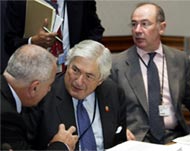Egypt set for Gaza border deployment
Egyptian border guards are to begin deployment on Saturday along the border with the Gaza Strip, security sources said, marking the first paramilitary deployment on the border since 1967.

The sources said on Wednesday that Egyptian guards were to begin taking the place of Israeli soldiers leaving their positions along the border area known as the Philadelphi corridor.
After months of negotiations, Egypt and Israel last Thursday signed a deal to see 750 lightly armed officers fan out to stop weapons being smuggled into the Gaza Strip once Israeli soldiers were recalled from the territory after a 38-year occupation.
According to the deal signed in Cairo and approved by the Israeli parliament, Egyptian guards are to patrol the Philadelphi corridor, 14km buffer zone created by the Israeli army on the Palestinian side of the Gaza Strip’s southern border.
No Egyptian troops have been present since the 1967 Middle East war when Israel seized Gaza, then administered by Egypt, and the Sinai.
Foreign observers
|
“If we would want at a later time to permit the entry and exit from Rafah to Egypt, and smoothly, we would want a third party there” Silvan Shalom, |
Also on Wednesday, Israeli Cabinet ministers proposed new arrangements for the Gaza-Egypt border, raising the possibility Israel would eventually agree to the movement of Palestinians in and out of Gaza under the supervision of foreign inspectors, without an Israeli presence.
The plan needs approval by the Israeli Cabinet on Sunday, and defense officials said there would be two days of intensive negotiations with the Palestinians before that. Israel plans to complete its pullout from Gaza next week.
The crossing between Gaza and Egypt is the only Palestinian land link to the outside world without crossing Israel.
Israel-Palestinian talks on arrangements over the Rafah crossing on the Gaza-Egypt border have failed to resolve the key issue: Israel insists on maintaining control over the flow of cargo and people in and out of Gaza for security reasons, while the Palestinians demand open access to the outside world to revive Gaza’s economy.
Plan outline
Full details of Israel’s decision on Wednesday were not released. However, defense officials and Foreign Minister Silvan Shalom said it would involve closing the Rafah crossing when Israel pulls out of Gaza next week. The vital crossing would be closed for at least six months.
 |
|
International envoy Wolfensohn |
During that time, Israel would retain control of Gaza’s access points. Palestinian travelers would pass into Egypt through a new crossing at the juncture of Gaza, Egypt and Israel near the Kerem Shalom village, and cargo from Gaza would cross into Egypt at Israel’s Nitzana crossing, about 30km from Gaza.
After six months, Rafah could reopen, Shalom said, raising the possibility that foreign inspectors could be deployed there to ensure weapons and militants do not pass into Gaza over the border.
Palestinians had already accepted the idea of foreign inspectors at the border as a compromise proposal to ease Israeli security fears.
European role
“If we would want at a later time to permit the entry and exit from Rafah to Egypt, and smoothly, we would want a third party there. There is no doubt that the Europeans are very interested to be the third party,” Shalom told Israel Radio.
Israeli Vice Premier Shimon Peres said an agreement on the border crossings was “crucial to the completion of the withdrawal from Gaza.”
Peres said he was optimistic an agreement could be reached in the coming days, before Israel withdraws from Gaza, which could come as soon as Monday.
“I think the gaps are very narrow and manageable, and I hope in a very short while they will be solved,” he said, without providing details.
International envoy James Wolfensohn, who has been working to broker the agreement, said the free flow of goods and people was crucial to the success of the Gaza pullout.
“You need a door to move in and out, and if you say that there has to be an Israeli at that door then it is not a withdrawal,” he said.